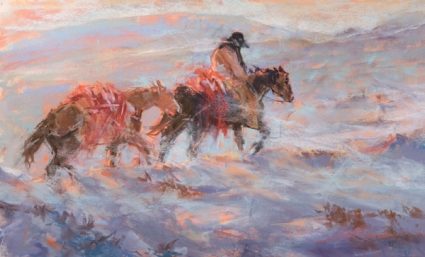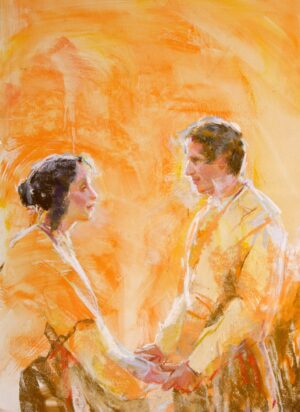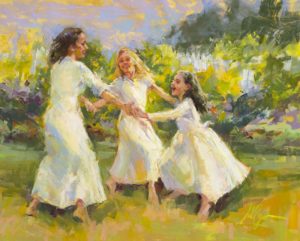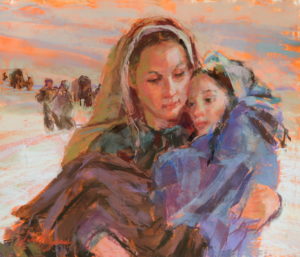On Sunday, October 26,1856, Brigham Young issued yet another of numerous calls for rescue of the handcart companies from the public pulpit. Many responded as quickly as possible, but Ephraim Knowlton Hanks had already been called by a voice during the night to go and help the handcart people.
In the fall of 1856, I spent considerable of my time fishing in Utah Lake; and in traveling backward and forward between that lake and Salt Lake City, I had occasion to stop once over night with Gurney Brown, in Draper, about nineteen miles south of Salt Lake City. Being somewhat fatigued after the day’s journey, I retired to rest quite early, and while I still lay wide awake in my bed I heard a voice calling me by name, and then saying: The handcart people are in trouble and you are wanted; will you go and help them?’ I turned instinctively in the direction from whence the voice came and beheld an ordinary sized man in the room. Without any hesitation I answered, Yes, I will go … When I got up the next morning I said to Brother Brown, The hand-cart people are in trouble, and I have promised to go out and help them. … I now hastened to Salt Lake City, and arrived there on the Saturday, preceding the Sunday on which the call was made for volunteers to go out and help the last hand-cart companies in. When some of the brethren responded by explaining that they could get ready to start in a few days; I spoke out at once saying, I am ready now! (All Hanks quotes are from an interview with Church historian Andrew Jensen in June 1891.)
Ephraim was on his way alone the next day, meeting other groups of rescuers already on the road. On November 2, Ephraim passed the Willie Handcart Company at Ft. Bridger and rendered them assistance. As there were already enough rescuers with the Willie Company to see them safely to Salt Lake City, Ephraim and others pushed on to render assistance to the companies further back on the trail. A few days later, Ephraim reached the South Pass rescue supply camp. He stayed there during a terrific storm with Reddick Allred, who was in charge of the camp. Ephraim said: The storm during these three days was simply awful. In all my travels in the Rocky Mountains both before and afterwards, I have seen no worse. When at length the snow ceased falling, it lay on the ground so deep that for many days it was impossible to move wagons through it. … I secured a pack-saddle and two animals (one to ride and one to pack), from Brother Allred, and began to make my way slowly through the snow alone. After traveling for some time I met Joseph A. Young and one of the Garr boys [Abel Garr], two of the relief company which had been sent from Salt Lake City to help the companies. They had met the immigrants and were now returning with important dispatches from the camps to the headquarters of the Church, reporting the awful condition of the companies.
This same cold and stormy weather had caused the Martin Handcart Company to seek shelter in a cove near Devil’s Gate where the Hodgett and Hunt Wagon Companies were busy unloading their wagons with the help of the rescuers already with them. Many of the rescuers with Ephraim near South Pass had decided to turn back to Salt Lake. They had already rendered assistance to the Willie Company, and assumed that the risk was too great to continue, and that the rear companies had either wintered over somewhere or perished in the cold. But Ephraim pressed on, keeping his promise. At some point he was joined by his Mormon Battalion friend, Arza Hinckley, who was also on his way out to assist in the rescue.
On November 10, Arza and Ephraim had stopped near Ice Springs Bench. Seeing a large herd of buffalo nearby, Ephraim went hunting and was able to kill a buffalo, dress and load the meat on his horses. The next day he killed another one. It was now nearing nightfall but before making it back to camp, Ephraim spotted the Martin Handcart Company and was able to deliver the life-sustaining meat to them and their previous rescuers who were now surviving on scant rations with them. Ephraim’s account states:
The sight that met my gaze as I entered their camp can never be erased from my memory. The starved forms and haggard countenances of the poor sufferers, as they moved about slowly, shivering with cold, to prepare their scanty evening meal was enough to touch the stoutest heart. When they saw me coming, they hailed me with joy inexpressible, and when they further beheld the supply of fresh meat I brought into camp, their gratitude knew no bounds. … At first I tried to wait on them and handed out the meat as they called for it; but finally I told them to help themselves. Five minutes later both my horses had been released of their extra burden the meat was all gone, and the next few hours found the people in camp busily engaged in cooking and eating it, with thankful hearts.
A prophecy had been made by one of the brethren that the company should feast on buffalo meat when their provisions might run short; my arrival in their camp, loaded with meat, was the beginning of the fulfillment of that prediction; but only the beginning, as I afterwards shot and killed a number of buffalo for them as we journeyed along. … After this the greater portion of my time was devoted to waiting on the sick. … Truly the Lord was with me and others of His servants who labored faithfully together with me in that day of trial and suffering. … I believe I administered to several hundreds in a single day; and I could give names of many whose lives were saved by the power of God.
Arza Hinckley wrote:
“We met the handcart folks at Ice Springs on the Sweetwater River. From there on into Salt Lake City, Eph Hanks … and I spent much of our time in camp in administering to the sick. Ephraim was a man of great faith.”
1 Nephi 3:7: … I will go and do the things which the Lord hath commanded …





